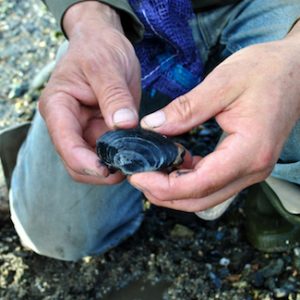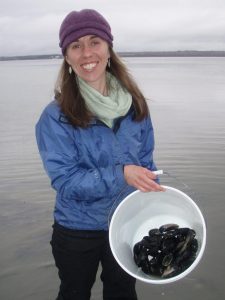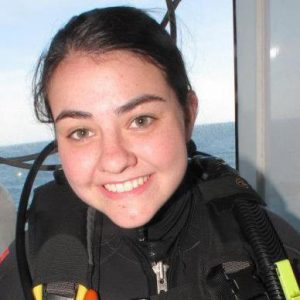Strengthening Coastal Economies
 Institution: University of Maine
Institution: University of Maine
Sponsor: The Diana Davis Spencer Foundation (2017-2019)
Overview
In January 2017, the Mitchell Center launched the Strengthening Coastal Economies project as part of the Diana Davis Spencer Partnership for a Sustainable Maine. The ultimate goal of this partnership is to develop, implement and evaluate solutions to complex problems requiring a careful balance between economic development and environmental preservation. The central element of the project’s solutions strategy is to inspire and equip a new generation of engaged, entrepreneurial citizens by providing students with transformative, hands-on experiences in the power of innovative partnerships to create a brighter future.
Strengthening coastal economies is an urgent sustainability challenge in Maine. Shellfishing is Maine’s second largest fishery with 1,700 licensed commercial harvesters and approximately $22 million in annual landings in 2015 according to the Maine Dept. of Marine Resources (DMR). Clam harvesting is an important source of income in coastal communities, especially in the economically disadvantaged midcoast and Downeast regions where jobs are limited.
The well-being of both clammers and clam flats is threatened by multiple factors, including effects of increased precipitation and associated polluted runoff, watershed development, failing wastewater infrastructure, and work-related pain and injury. Closure of clam flats due to poor water quality conditions puts severe pressure on struggling local economies, with frequent closures increasing the economic uncertainty already plaguing this fishery. This uncertainty is threatening the future of a way of life that has persisted on Maine’s coast for many decades.
Coastal Maine communities are making progress on addressing persistent water pollution that negatively affects shellfishing economies. This progress is in part due to support from the Diana Davis Spencer Partnership. However, through our efforts to address water pollution we have identified an urgent need to build civic capacity and leadership within the shellfish industry to help connect and leverage efforts to address water pollution and similar challenges.
The threats facing coastal communities related to water pollution, invasive species and the limited civic capacity to manage fisheries has a direct and negative impact on coastal economies. The clam fishery is the second largest fishery in the state and is also the most directly impacted by water pollution. In some communities, especially in Downeast regions, individual harvesters lose approximately $2,500 per year due to mudflat closures.
Clam prices are highly unstable due to a host of factors such as water pollution closures, clam imports from out of state, and the role of the shellfish dealer in negotiating prices. The economic uncertainty, where clammers have a difficult time relying on the fishery to provide a regular and predictable income, is contributing to the overall decline in commercial clam license sales.
Shellfish dealers are a key stakeholder group, as dealers can help connect harvesters and clamming communities with state and regional markets and make clamming a more economically predictable and viable option. There is a need to improve the connections between shellfish dealers and coastal communities to promote business innovation and effective shellfish management at a local level. Past work in Maine and other regions has demonstrated the value of strengthening co-management strategies – that is, the joint management of the shellfishery via power sharing and shared decision-making among multiple local interests and governmental agencies.
Proposed Activities
- Build upon the learning network established via the Foundation’s past support to strengthen shellfish dealer leadership and business innovation in the state.
- Work with shellfish dealers and other stakeholders in the shellfish industry such as clammers, municipal officials, state managers, and non-profit organizations to establish the Maine Shellfish Initiative through a comprehensive scoping and capacity development process.
- Involve students as co-leaders and facilitators of the Maine Shellfish Initiative to support their leadership and entrepreneurship training. The Diana Davis Spencer Scholars piloted this approach in March 2018 when they helped to facilitate a research needs listening session at the Shellfish Focus Day of the Maine Fishermen’s Forum.
Potential Outcomes
- Strengthen and expand the learning network and industry leadership through improved relationships and information sharing with Maine shellfish dealers.
- Support regionalization of shellfish co-management through the strategic design of the Maine Shellfish Initiative, identifying and connecting communities that want to promote effectiveness and efficiency via comanagement.
- Through the Maine Shellfish Initiative, prioritize and advance innovative solutions to water pollution, invasive species, and civic capacity for management to increase shellfish populations and reduce economic uncertainty in fishing communities.
In our Strengthening Coastal Economies project, we have helped Diana Davis Spencer Scholars gain experience in entrepreneurship, communication, collaboration, problem-solving and other leadership skills via seven core activities:
- Growing the Scholars’ role in promoting innovation in the shellfish industry. For example, the Scholars helped organize and support the 2019 Shellfish Focus Day, which has become a major component of the annual and nationally-renown Maine Fishermen’s Forum. The number and diversity of participants in the 2019 Shellfish Focus Day was the highest in its history.
- Refining the design of decision support tools in collaboration with the Maine Dept. of Marine Resources to help reduce the adverse impacts of water pollution on the shellfishing economy.
- Conducting a comprehensive assessment to ensure that the work being done by the Scholars aligns with the needs and concerns of shellfish partners and stakeholders.
- Enhancing the process by which Diana Davis Spencer Scholars are recruited and trained.
- Strengthening integration with related efforts in Maine’s shellfish industry to leverage and expand the reach and impact of the Diana Davis Spencer Foundation’s investments, including the Maine Shellfish Restoration and Resilience Project and the Maine Shellfish Learning Network through Maine Community Foundation’s Broad Reach Fund.
- Creating a website for the Strengthening Coastal Economies project and related efforts to make information more relevant and accessible. The website is scheduled to go live in September, 2019.
- Assessing how prior Diana Davis Spencer Foundation investments are building capacity for current and new project activities.
The first step of the project was to assemble an outstanding team to conduct the work. The team is led by Bridie McGreavy, a Mitchell Center Fellow and professor in UMaine’s Department of Communication and Journalism. McGreavy has more than seven years of experience leading teams of students and faculty who are working to improve Maine’s shellfishery and she is also a member of the Maine Shellfish Advisory Council. The Council serves in an advisory role to DMR and brings together key partners from across Maine’s shellfishery.

McGreavy is supported by Sara Randall, who has extensive experience working with the Maine Clammers Association. Sara helped initiate the project and provides connections with shellfishermen across the state. The project is also supported by Keith Evans, a professor in the School of Economics, and Damian Brady, a professor in the School of Marine Sciences, as faculty collaborators and student mentors.
Six students were recruited as Diana Davis Spencer Scholars and they are currently working together to gain skills in entrepreneurship, teamwork, leadership, and problem-solving. Through their hard work and dedication, they have already achieved multiple project objectives, and have great momentum for continuing and expanding their work in the coming months. The student team includes:
Tyler Quiring, a Ph.D. student in Communication and Journalism, is using innovative web-based approaches to tell the stories of clammers and help people learn more about the value of clamming in Maine’s culture and economy. The Clam Cam website he helped to create launched in May and helps people learn about and celebrate the culture of clamming.
Gabby Hillyer, a Masters student in Marine Policy and Oceanography, is focusing her work in Frenchman Bay and the Medomak River estuary near Waldoboro. She is helping address water quality problems in both these valuable shellfishing regions.

Cassie Page, an undergraduate in Communication and Journalism, is working with the Maine Shellfish Advisory Council to identify and share best practices for science communication in the industry.
Carter Hathaway, a Master’s student in Communication and Journalism, is working directly with clammers to do mini-documentaries that raise awareness about clamming.
Tony Sutton, a Ph.D. student in Ecology and Environmental Sciences and member of the Passamaquoddy Tribe, is focusing his work in far Downeast Maine, a region in desperate need of economic development. He started his ethnographic research this summer.

Shuling Chen, a Master’s student in the School of Economics, is focusing her work in Frenchman Bay and four other Downeast towns. She is interested in understanding how clammers are adapting to water quality closures and how these closures impact market dynamics. She is especially interested in helping clammers identify innovative ways to reduce the economic uncertainty of shellfishing as a livelihood.
The team is making steady progress on meeting its key objectives including assembling an interdisciplinary team of undergraduate and graduate students, training and mentoring students in leadership and social entrepreneurship skills, and helping students practice and hone these skills through applied projects to support Maine’s shellfishing economy.
- News Article (July 2020): A fishery worth investing in
- News Article (June 2020): Strengthening Coastal Economies broadens shellfish focus to include oysters, scallops and mussels
- News Article: Drifting with the Tides – Master’s student Gabby Hillyer’s schedule is driven by tidal flow
- News Article: Diana Davis Spencer Scholar Cassie Page
- Maine Shellfish Research Compendium (March 2018)
- Highlights from 2018 Shellfish Focus Day at the Maine Fishermen’s Forum
